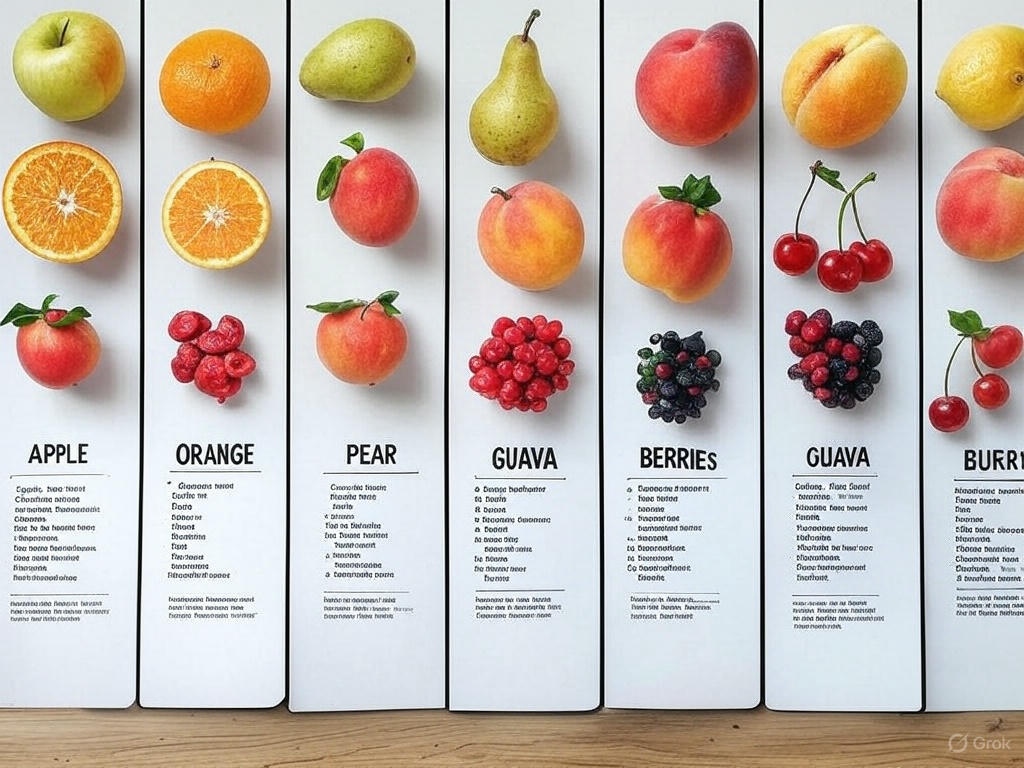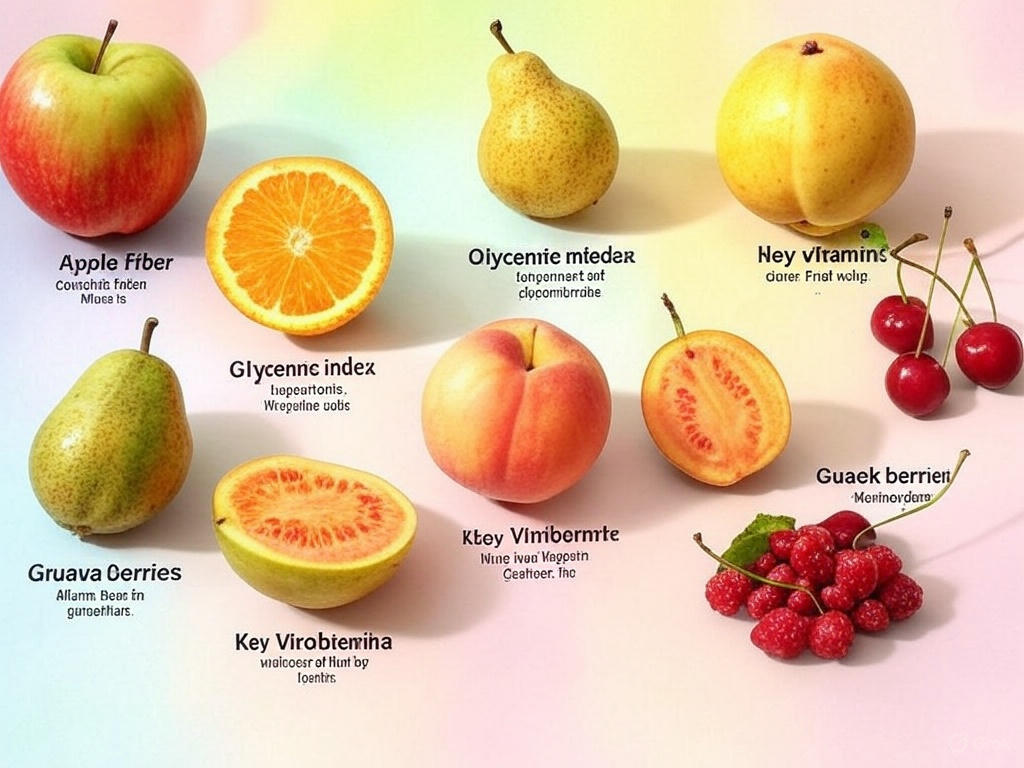Contents
Unlock the Sweet Secret: 7 Fruits to Manage Diabetes Naturally

Table of Contents
1. A Personal Journey with Dr. Emily Carter
2. Why Fruits Are Your Diabetes Allies
3. The Magnificent Seven Fruits for Diabetes
3.1 The Humble Apple: A Crunchy Powerhouse
3.2 The Zesty Orange: A Burst of Goodness
3.3 The Elegant Pear: Sweet and Steady
3.4 The Juicy Peach: Sunshine in Every Bite
3.5 The Mighty Guava: A Tropical Treasure
3.6 The Vibrant Berries: Nature’s Candy
3.7 The Sweet Cherry: A Tiny Miracle
4. How to Enjoy These Fruits Smartly
5. Why This Matters More Than Ever
6. FAQs
7. Take Action Today!
1. A Personal Journey with Dr. Emily Carter
Imagine strolling through a quaint town where the air smells of ripe orchards and the sun paints the meadows gold. That’s where I first met Dr. Emily Carter, a nutritionist with a knack for turning food into medicine. One chilly autumn day, a friend, Jake, walked into her cozy clinic, his face clouded with worry. Recently diagnosed with diabetes, he asked, “Dr. Carter, does this mean I can never enjoy sweets again?” Her warm smile and wise words changed everything. “Jake,” she said, “nature offers sweet solutions to manage diabetes naturally. Let me share seven fruits that can transform your journey.” Intrigued? Let’s dive into these life-changing health hacks that could make this guide go viral!
—
2. Why Fruits Are Your Diabetes Allies
Living with diabetes can feel like a battle against sugar, but it’s about balance. Your body struggles with glucose when insulin falters, making healthy choices key. Fruits are secret weapons to manage diabetes naturally, packed with fiber, vitamins, and antioxidants to stabilize blood sugar without guilt. I recall Jake’s relief when Dr. Carter explained this—it’s about smart eating, not deprivation. Ready to explore fruits that redefine your health? Let’s proceed!
The Magnificent Seven Fruits for Diabetes

Dr. Carter leaned in, her eyes sparkling, as she introduced Jake to her top picks to manage diabetes naturally. Here’s the rundown of these natural health remedies.
3.1 The Humble Apple: A Crunchy Powerhouse
Picture biting into a crisp apple—pure joy! Apples offer vitamin C and fiber, with a medium one providing 25g carbs and 4g fiber. Their glycemic index (GI) of 30-50 releases sugar slowly. The skin is key—don’t toss it! Growing up, I’d grab an apple from my grandma’s tree, now a staple to manage diabetes naturally. Try one today!
3.2 The Zesty Orange: A Burst of Goodness
Oranges bring a tangy twist. Rich in vitamin C, folate, and potassium, a medium orange has 15g carbs and 3g fiber, with a GI of 40. Hydration and antioxidants make it a favorite. Dr. Carter said, “It’s nature’s multivitamin!” Perfect to manage diabetes naturally.
3.3 The Elegant Pear: Sweet and Steady
Pears satisfy sweet cravings safely. With 25g carbs, 6g fiber, and a low GI, they stabilize blood sugar. Last summer, I shared a pear with my nephew during a picnic—a secret to manage diabetes naturally worth sharing!
3.4 The Juicy Peach: Sunshine in Every Bite
Peaches evoke lazy farm afternoons. A medium peach offers 15g carbs, 2g fiber, and a low GI, plus vitamin C and potassium to fight fatigue. Dr. Carter’s passion convinced Jake—it’s a life-changing way to manage diabetes naturally!
3.5 The Mighty Guava: A Tropical Treasure
Guava won me over at a tropical market. With 14g carbs, 3g fiber, and a GI of 25, it’s rich in vitamin C and antioxidants. Locals praised it for energy, confirmed by Dr. Carter as a fruit to manage diabetes naturally. Slice one open!
3.6 The Vibrant Berries: Nature’s Candy
Berries—strawberries, blueberries, raspberries—are my treat. Packed with vitamin C, vitamin K, and fiber, their low GI and antioxidants boost immunity. I mixed them into a yogurt bowl for a friend with diabetes—a proven way to manage diabetes naturally!
3.7 The Sweet Cherry: A Tiny Miracle
Cherries are unsung heroes. Loaded with antioxidants and vitamin C, they enhance insulin sensitivity—a game-changer for diabetes. Dr. Carter’s patient story inspired Jake—cherries help manage diabetes naturally!
4. How to Enjoy These Fruits Smartly
Dr. Carter’s advice to Jake—moderation is key—applies to all. Eat fruits whole; juicing removes fiber that prevents sugar spikes. Pair with nuts or yogurt, and monitor levels. Last year, I adjusted my diet with these tips and felt energized—a healthy living tip to manage diabetes naturally!
Why This Matters More Than Ever
5. Why This Matters More Than Ever
With diabetes rates at 460 million by 2025, natural health remedies gain traction. These fruits are a lifestyle to manage diabetes naturally. Dr. Carter’s clinic saw a 30% uptick in patients, and Jake’s story is one of many. Spread this life-changing health hack!
FAQs
6. FAQs
- Q1: Can I eat these fruits on diabetes medication?
A: Yes, but consult your doctor. They support managing diabetes naturally, but monitor meds. - Q2: How much fruit daily?
A: 1-2 servings (e.g., one apple) align with tips to manage diabetes naturally. - Q3: Safe for all diabetes types?
A: Generally, yes, but tailor with a nutritionist for managing diabetes naturally. - Q4: Can juice replace fruits?
A: No, juice lacks fiber. Whole fruits are best to manage diabetes naturally. - Q5: How to check blood sugar stability?
A: Use a glucometer post-meal. Stable levels show these methods to manage diabetes naturally work. - Q6: Safe for kids with diabetes?
A: Yes, in moderation, with a pediatrician’s input to manage diabetes naturally. - Q7: Where to find these fruits?
A: Local markets or frozen sections—stock up to manage diabetes naturally!
Take Action Today!
7. Take Action Today!
Dr. Carter’s wisdom sparked Jake’s journey, and it can yours. Grab an apple, savor a peach, and share this guide to manage diabetes naturally with friends. Visit our site for more natural health remedies and join a community transforming lives. Your sweet journey starts now—share your story!
